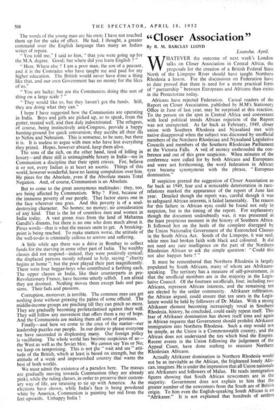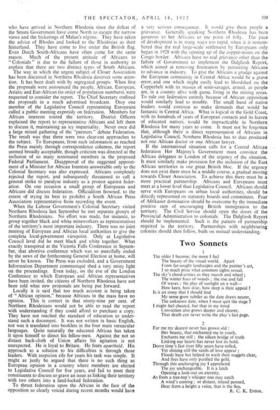"Closer Association"
By R. M. BARCLAY LLOYD
Luansha, April.
HATEVER the outcome of next week's London talks on Closer Association in Central Africa, the proposals for the creation of a British Federal State North of the Limpopo River should have taught Northern Rhodesia a lesson. For the discussions on Federation have to date proved that there is need for a more practical form of " partnership " between Europeans and Africans than exists in the Protectorate today.
Africans have rejected Federation. Casual readers of the Report on Closer Association, published by H.M's Stationery Office in June of last year, may be surprised at this reaction. To the person on the spot in Central Africa and conversant with local political trends African rejection of the Report was not unexpected. As far back as February, 1949, closer union with Southern Rhodesia and Nyasaland met with native disapproval when the subject was discussed by unofficial members of the Northern Rhodesian and Nyasaland Legislative Councils and members of the Southern Rhodesian Parliament at the Victoria Falls. A veil of secrecy enshrouded the con- ference and out of this grew suspicion. When minutes of the conference were called for by both Africans and Europeans and were not forthcoming, the word federation in African eyes became synonymous with the phrase, "European domination."
If suspicion greeted the suggestion of Closer Association as far back as 1949, fear and a noticeable deterioration in race- relations marked the appearance of the report of June last year. Detailed though the report was, careful though it was to safeguard African interests, it failed lamentably. The reason for this failure in African eyes could be found not only in suspicion, but in the timing of the report. For explanatory though the document undoubtedly was, it was presented at the least propitious moment in the history of Southern Africa. It followed hot on the heels of the complete disregard by the Union Nationalist Government of the Entrenched Clauses in the South Africa Act. South of the Limpopo, it was said, white men had broken faith with black and coloured. It did not need any rare intelligence on the part of the Northern Rhodesian African to ask the simple' question: "Could this not also happen here ? "
It must be remembered that Northern Rhodesia is largely populated by South Africans, many of whom are Afrikaans- speaking. The territory has a measure of self-government, in that the unofficial members are in the majority in the Legis- lative Council. Of the fourteen unofficials, four, including two Africans, represent African interests, and the remaining ten are elected by the settler community. Afrikaner infiltration, the African argued, could ensure that ten seats in the Legis- lature would be held by followers of Dr. Malan. With a strong Afrikaner element becoming increasingly vocal in Southern Rhodesia, history, he concluded, could easily repeat itself. This fear of Afrikaner domination has shown itself time and again in African requests that Government should prohibit Afrikaner immigration into Northern Rhodesia. Such a step would not be simple, as the Union is a Commonwealth country, and the African does not understand the ties which bind the Empire. Recent events in the Union following the judgement of the Appeal Court, have done nathing to reassure Northern Rhodesian Africans.
Actually Afrikaner domination in Northern Rhodesia would not be as inevitable as the African, the frightened lonely Afri- can, imagines. He is under the impression that all Union nationals are Afrikaners and followers of Malan. He reads immigration figures showing that South African newcomers are in the majority. Government does not explain to him that the greater number of the newcomers from the South are of British origin. To him even the English-speaking South African is an "Afrikaner." It is not explained that hundreds of settlers who have arrived in Northern Rhodesia since the defeat of the Smuts Government have come North to escape the narrow views and the bickerings of Malan's regime. They have taken the advice of Rhodes and looked to the Rhodesias as their hinterland. They have come to live under the British flag. Even Dutch South-Africans have often come for the same reason. Much of the present attitude of Africans to " Colonials " is due to the failure of those in authority to explain that there are two distinct types of South Africans. The way in which the urgent subject of Closer Association has been discussed in Northern Rhodesia deserves some atten- tion. It has been dealt with by segregated groups. When first the proposals were announced the people, African, European, Asiatic and Eur-African (in order of population numbers), were requested to consider the report. The Chief Secretary outlined the proposals in a much advertised broadcast. Only one member of the Legislative Council representing Europeans called a public meeting expressly on federation. Members for African interests toured the territory. District Officers explained the report to representative Africans and left them to discuss it, maintaining an icy impartiality. Never once did a large mixed gathering of the "partners" debate Federation. The result was that there were two clear-cut approaches to the subject. To Europeans, from such information as reached the Press mainly through correspondence columns, the report seemed broadly acceptable, though criticism was directed at the inclusion of so many nominated members in the proposed Federal Parliament. Disapproval of the suggested appoint- ment of a Minister for African Interests answerable only to the Colonial Secretary was also expressed. Africans completely rejected the report, and subsequently threatened to call a general strike to paralyse industry as a protest against feder- ation. On one occasion a small group of Europeans and Africans did discuss federation. Officialdom frowned, to the extent of trying its best to prohibit a South African Press Association representative from recording the event.
When the Labour Government's Colonial Secretary visited Northern Rhodesia last September he met separate groups of Northern Rhodesians. No effort was made, for instance, to group together black and white mineworkers as representatives of the territory's most important industry. There was no joint meeting of European and African local authorities to give the complete local-government viewpoint. Only at Legislative Council level did he meet black and white together. What exactly transpired at the Victoria Falls Conference in Septem- ber, that abortive conference which was so mercifully ended by the news of the forthcoming General Election at home, will never be known. The Press was excluded, and a Government Information Department communiqué shed a very misty light on the proceedings. Even today, on the eve of the London Conference to which European and African representatives have been invited, the citizens of Northern Rhodesia have not been told what new proposals are being put forward.
Locally it is said that too much account is being taken of "African opinion," because Africans in the mass have no opinion. This is correct in that ninety-nine per cent. of Northern Rhodesians would not be able to read the report with understanding if they could afford to purchase a copy. They have not reached the standard of education to under- stand such a document. It was not written in basic English, nor was it translated into booklets in the four main vernacular languages. Quite naturally the educated African has taken it upon himself to direct his fellow-men. Against the not so distant back-cloth of Union affairs his agitation is not unexpected. He is loyal to Britain. He fears apartheid. His approach to a solution to his difficulties is through those leaders. With suspicion rife for years his task was simple. It might as justly be argued that there is no such thing as European opinion in a country where members are elected to Legislative Council for five years, and fail to meet their constituents to discuss so grave an issue as linking their territory with two others into a land-locked federation.
To thrust federation upon the African in the face of the opposition so clearly voiced during recent months would have a very serious consequence. It would give these people a grievance. General!). speaking Northern Rhodesia has been generous to her Africans to tile point of folly. The pace of development is in many ways too rapid, when it is remem- bered that the real large-scale settlement by Europeans only began in 1928 with the opening up of the copper-mines on the Congo border. Africans have no real grievance other than the failure of Government to implement the Dalgliesh Report, which aimed at removing frustration by permitting Africans to advance in industry. To give the Africans a grudge against the European community in Central Africa would be a grave error, and one which might easily lead to bloodshed on the Copperbelt with its masses of semi-savages, armed, as people are, in a country alive with game, living in the mining areas. To rule out federation entirely because of African opposition would similarly lead to trouble. The small band of native leaders would continue to make demands that would be fantastic in Central Africa. What is logical in the Gold Coast, with its hundreds of years of European contacts and its leaven of educated natives, would be impracticable in Northern Rhodesia for many years to come. It must not be forgotten that, although there is direct representation of Africans in Legislative Council, Northern Rhodesia has to date produced not one African doctor or one African lawyer.
If the international situation calls for a Central African federation Her Majesty's Government must convince the African delegates to London of the urgency of the situation. It must similarly make provision for the inclusion of the East African territories in one great British bloc. If the urgency does not exist there must be a middle course, a gradual moving towards Closer Association. To achieve this there must be a more practical partnership. Africans and Europeans must meet at a lower level than Legislative Council. Africans should serve with Europeans on urban local authorities, should be directly represented on statutory boards and committees. Fear of Afrikaner domination should be overcome by the immediate positive step of encouraging British immigration to the territory. The Civil Service should open the doors of the Provincial Administration to colonials. The Dalgliesh Report should be implemented. Such is the pattern of partnership required in the territory. Partnerships with neighbouring colonies should then follow, built on mutual understanding.



































 Previous page
Previous page